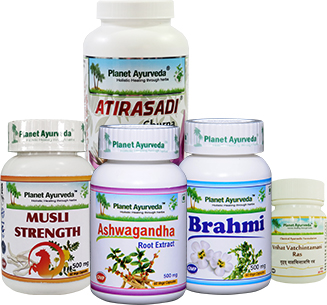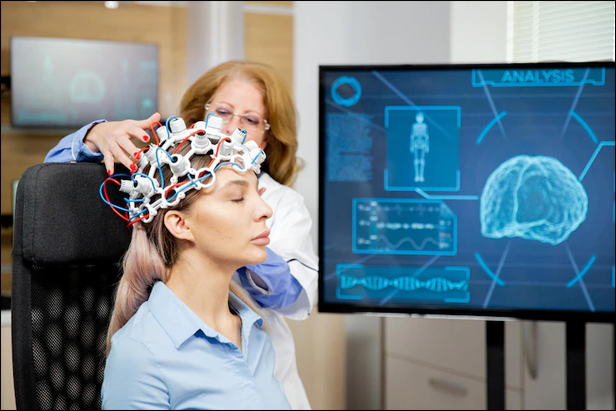Alternative Treatment For Demyelinating Diseases With Herbal Remedies
Abstract
Demyelinating Diseases include the conditions that are associated with the damage of myelin sheath which affects the Brain health. Brain health is the critical piece of your overall health that is a base on how you communicate, how you make decisions, live a productive life and good problem solving. The Brain is responsible for maintaining the whole functioning of the body and potentially considered as the valuable organ of the human body. So the Brain health is considered as the important one for the overall healthy functioning of the body. Now let’s discuss in detail about Demyelinating diseases, their types and ayurvedic management.

Introduction
Demyelinating diseases include any of the conditions which causes damage to the myelin sheath- a protective covering of the nerve fibers mainly includes nerves leading to the spinal cord and eyes. The myelin sheath acts like electric wires that help in transferring of signals from the brain to the whole body. The damage to myelin sheath causes slow down and even stopping of nerve impulses which leads to neurological diseases. When the damage occurs in myelin sheath there is a scar formation which further leads to hindrance in the movement of signals thus the nerves do not work well as they have to perform. Now further let’s discuss all about Demyelinating diseases and how ayurveda helps in the management of the same.
Types of Demyelinating Diseases
1. Multiple Sclerosis
This is a chronic condition which involves the CNS (central nervous system). In this condition the immune system attacks the myelin sheath and leads to degeneration of myelin sheath. In this condition firstly temporary lesions occur and inflammation occurs in the myelin sheath. After some time it leads to long lasting lesions after the scar formation that make it hard for the brain to pass proper signals to the whole body.
Symptoms of Multiple Sclerosis: People with Multiple Sclerosis experience symptoms in a wide range. As the nature of the disease is different the symptoms may vary from person to person. The severity also varies from year to year and from month to month. Following are some of the main symptoms of Multiple Sclerosis
- Fatigue
- Difficult walking
- Vision problems
- Sleep issues
- Tremors
- Uncontrolled bladder habits
- Difficulty chewing
- Difficulty swallowing
- Cognitive issues
2. Acute Disseminated Encephalomyelitis (ADEM)
ADEM is a neurological condition which involves a severe streak of inflammation in CNS (Central Nervous System). It includes parts like the spinal cord, brain and optic nerves sometimes. The swelling occurs on ADEM damage the myelin sheath thus leads to various symptoms.
Symptoms of ADEM: People over 50% experience symptoms within two weeks of condition and usually a viral or bacterial infection in the upper respiratory tract. The symptoms experienced by a patient of ADEM are written as follows:
- Headache
- Fever
- Stiff neck
- Balance problems
- Drowsiness
- Difficulty swallowing
- Difficulty speaking
3. Neuromyelitis optica (Devic’s Disease)
This is also one of the diseases associated with CNS which affects the optic neuritis (eye nerves) and the spinal cord. This condition is also one of the autoimmune conditions in which the immune system reacts against the CNS cells, mainly the spinal cord, optic nerves and sometimes the Brain. Its cause is usually unknown and sometimes it occurs after an infection and may be associated with some other autoimmune condition.
Symptoms of Neuromyelitis Optica: Neuromyelitis optica cause blindness, weakness in arms and legs, paralysis in arms and legs, loss of sensation, painful spasms, uncontrollable vomiting, bowel or bladder dysfunction, hiccups, spinal cord damage. Most of the children get affected with this condition and face seizures, confusion and coma. The flare-up of neuromyelitis is reversible but it may cause permanent problems with walking and permanent vision loss.
4. Transverse Myelitis
It is the rare disease which includes inflammation that leads to injury of the spinal cord. This condition includes sensory alterations, weakness, autonomic dysfunction which includes involuntary activities like breathing, heart pumping, the digestion, absorption, etc. So it’s obvious if a person has a condition of Transverse Myelitis then one must face difficulty in the autonomic body functioning.
Symptoms of Transverse Myelitis: This condition may affect at any age, any race and any gender. It is not genetic and not run in families. It usually occurs between the age of 10 – 19 yrs and 30 – 39 yrs. The symptoms typically faced by the affected person are as follows:
- Sensory problems
- Pain
- Bladder and bowel issues
- Weakness
- Paralysis
5. MOGAD (MOG Antibody Disease)
This is an immune-mediated neurological disorder which consists of the inflammation of optic nerve, brain and spinal cord. MOG is a protein named Myelin Oligodendrocyte glycoprotein which is present at the surface of myelin sheath. Its function is not actually known but basically in this disease this protein is a target. The severity of the disease varies from person to person and the diagnosis of the condition is done by the presence of MOG antibodies in the blood.
Symptoms of MOGAD: Following symptoms are faced by the affected person in case of MOGAD:
- Loss of coloured vision
- Blurring of vision
- Loss of vision
- Weakness in limbs
- Paralysis of limbs
- Seizures
- Loss of bladder control
- Loss of bowel control
- Loss of sensation
- Bladder retention
6. Balo’s Disease
This condition is also the autoimmune demyelinating condition in which the immune system attacks the healthy tissue of brain and spinal cord that cause inflammation and then scars. The difference in Balo’s disease and other demyelinating diseases is that it also damages the tissue along with the myelin sheath and the lesions look like a spot, blotches or bull’s eye marks.
Symptoms of Balo’s Disease: Many of the symptoms are same as that of Multiple Sclerosis and the mostly included symptoms are as follows:
- Headaches
- Muscle pain
- Muscle spasm
- Seizures
- Muscle weakness
- Paralysis
- Trouble speaking
- Behavioral changes
- Trouble thinking
Above explained are the different types of demyelinating diseases along with the cause and its symptoms. Now let’s discuss the diagnosis and ayurvedic view of Demyelinating diseases.
Diagnosis
The diagnosis of Demyelinating Diseases is done by using several different diagnostic techniques. A proper medical and physical history is needed which includes brain, optic nerves, spine and peripheral nerves. A clinical diagnosis is done by asking a few questions about the symptoms, any infection history, family history, checking the muscle strength, ability to walk, coordination, eye examination, etc. Proper imaging is done for checking any kind of demyelination such as MRI which shows different patterns of demyelination that differentiate the different types of demyelination.
Ayurvedic View
Demyelinating disease is basically a neurological disorder and as per Ayurveda it can be correlated to vata vyadhi. Basically the demyelinating disease has a degenerative effect on myelin sheath so that vata dosha aggravation is the reason behind it. When the vata dosha aggravates it directly causes depletion of dhatus, be depletion of dhatus the degeneration occurs, so it may cause demyelination of myelin sheath. So basically the management of Demyelinating Diseases as per ayurveda is to balance the vata dosha. Let’s discuss the management of Demyelinating Diseases by Planet Ayurveda.
Herbal Remedies By Planet Ayurveda For The Management of Demyelinating Diseases
Planet Ayurveda is a clinic with GMP certification which formulates their own herbal supplementations for several health concerns. All the herbal remedies are devoid of any kind of added preservatives, color, fiber, gums, resins and any kind of synthetic materials. For the purpose of managing the Demyelinating diseases Planet Ayurveda provides 5 herbal remedies that we will discuss below in detail how all these remedies work alone in the management of Demyelinating Diseases.
- Brahmi Capsules
- Ashwagandha Capsules
- Vrihat Vatchintamani Ras
- Musli Strength Capsules
- Atirasadi Churna
Product Description
1. Brahmi Capsules
Brahmi Capsules by Planet Ayurveda is a miraculous herbal remedy which consists of standardised extract of Brahmi (Bacopa monnieri). Brahmi consists of potent brain boosting properties and is used as a memory enhancer, aphrodisiac and a health tonic. These herbal capsules possess very miraculous antioxidant effects that reduce formation of free radicals and prevent oxidative stress. It is useful in conditions that are related to neurodegeneration. It has a wonderful anti-inflammatory so we can use brahmi capsules in case of Demyelinating diseases.
Dosage: 2 capsules twice daily with plain water after meals.
2. Ashwagandha Capsules
Ashwagandha capsules is a herbal remedy by Planet Ayurveda consisting of standardised extract of Ashwagandha (Withania somnifera). Ashwagandha is a miraculous adaptogenic herb which aids in decreasing any kind of stress in the body which is the main cause behind any degeneration in the body. It also provides strength and immunity to the body and relieves associated symptoms of demyelinating diseases such as muscle pain, weakness, spasm, weakness in limbs, and various other symptoms.
Dosage: 1 capsule twice daily with plain water after meals.
3. Vrihat Vatchintamani Ras
Vrihat vatchintamani ras is a classical ayurvedic formulation which is formulated by Planet Ayurveda under the strict observance of M.D. Ayurveda practitioners. This ayurvedic formulation is present in tablet form and consists of ingredients such as swarna bhasma (calyx of gold), rajat bhasma (calyx of silver), loha bhasma (caly of iron), kumari ras (Aloe barbadensis) and various others. These tablets have been used for pacifying vata dosha and various neurological disorders since ancient times. As we have studied earlier, vata dosha aggravation is the main cause behind the demyelination of the myelin sheath, so vrihat vatchintamani is considered as an effective remedy.
Dosage: 1 tablet twice daily with plain water after meals.
4. Musli Strength Capsules
Musli strength capsules by Planet Ayurveda is a miraculous capsule formulation of boosting strength and immunity. These herbal capsules consist of standardised extract of two herbs such as safed musli (Chlorophytum borivilianum) and gokshura (Tribulus terrestris). The herbal formulation consists of adaptogenic, immunomodulatory, strengthening, antioxidants and anti inflammatory. These properties help in alleviating the inflammation, reduces the scars in myelin sheath, regenerates myelin sheath and releve the associated symptoms.
Dosage: 2 capsules twice daily with plain water after meals.
5. Atirasadi Churna
Atirasadi churna by Planet Ayurveda is a herbal formulation prepared in powder form. This herbal powder consists of ingredients like safed musli (Chlorophytum borivilianum), kali musli (Curculigo orchioides), gokshura (Tribulus terrestris) and various others. This churna contains immune boosting and strengthening properties which aids in boosting the immunity of the person affected with demyelinating disease as well as it prevents the degeneration of myelin sheath. Atirasadi churna is very effective in providing strength and alleviating symptoms such as muscle weakness, pain, muscle spasm, fatigue and various associated conditions.
Dosage: 1 tsp twice daily with plain water after meals.
Conclusion
Demyelinating diseases include any of the conditions which causes damage to the myelin sheath- a protective covering of the nerve fibres mainly includes nerves leading to the spinal cord and eyes. It includes various types such as Multiple Sclerosis, Transverse Myelitis, ADEM, Neuromyelitis optica, Balo’s disease and some others. The main cause of the demyelinating disease is autoimmune conditions. The symptoms mainly consist of weakness, spasm and pain in limbs, disturbed bowel and bladder functioning, paralysis and some other. For the management of Demyelinating Diseases Planet Ayurveda Provides herbal remedies that generally pacifies vata dosha, provides strength and boosts the immunity of the patient. These herbal remedies are devoid of any kind of added preservatives and synthetic material due to which these remedies are free from any kind of side effects. So feel free to consume these herbal remedies and if you feel any query while taking the herbal remedies you can contact us on www.planetayurveda.com.




